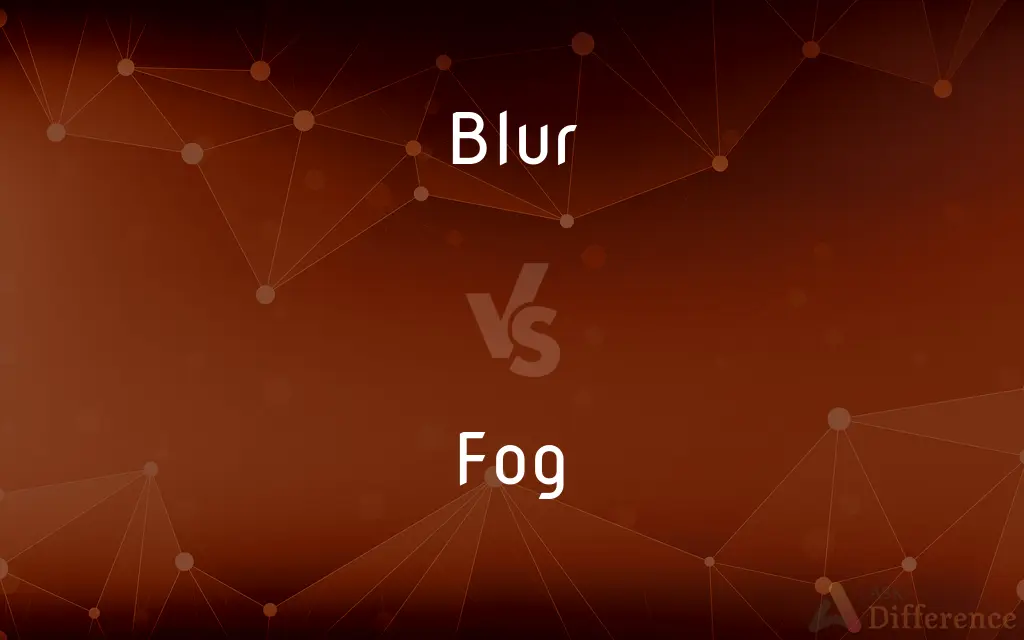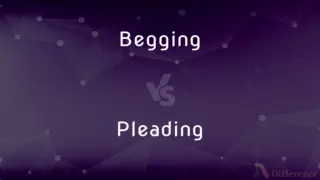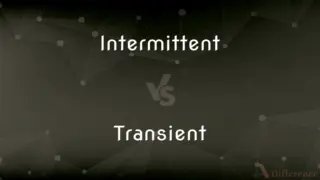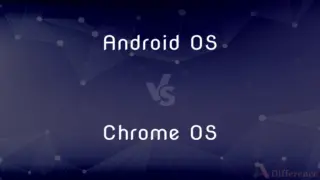Blur vs. Fog — What's the Difference?
Edited by Tayyaba Rehman — By Fiza Rafique — Updated on March 31, 2024
Blur refers to a lack of sharpness or clarity in an image or view, while fog is a weather phenomenon consisting of condensed water vapor reducing visibility.

Difference Between Blur and Fog
Table of Contents
ADVERTISEMENT
Key Differences
Blur occurs when an object or image lacks distinctness or sharpness, often resulting from movement, improper focus, or a specific photographic effect. It can affect any visual element, making it difficult to discern details. Fog, on the other hand, is a meteorological condition where tiny water droplets suspended in the air obscure visibility in the atmosphere, affecting a wide area and not just a single object.
While blur is usually related to the quality of perception or representation of an image, fog directly impacts the physical environment. Blurry images can result from issues with the eyes, camera settings, or other visual media, whereas fog is a natural occurrence that can influence travel, climate, and daily activities by reducing visibility.
The concept of blur is applicable in various contexts, including photography, videography, and vision, where focus and clarity are essential. Fog is specifically related to weather and atmospheric conditions, having broader implications for safety, transportation, and outdoor activities.
Blurring can be intentional, such as in artistic photography to convey motion or focus attention, or unintentional, indicating a problem with vision or equipment. Fog is always a natural condition, though its intensity and impact can vary based on geographic location, temperature, and humidity levels.
Comparison Chart
Nature
Lack of sharpness or clarity
Weather phenomenon of condensed water vapor
ADVERTISEMENT
Cause
Movement, improper focus, photographic effect
Condensation of water vapor in the air
Context
Photography, videography, vision
Meteorological, affecting visibility
Impact
Affects perception or representation of images
Affects physical environment and visibility
Control
Can be controlled or manipulated
Natural occurrence, varies by weather conditions
Compare with Definitions
Blur
Often associated with visual media.
The filmmaker used blur to convey the character's confusion.
Fog
A type of low-lying cloud.
The valley was covered in thick fog this morning.
Blur
Can be due to movement or focus issues.
His vision was a blur without his glasses.
Fog
Reduces visibility.
The fog was so dense that it was hard to see the road.
Blur
Can be intentional or unintentional.
She loves using blur for artistic effect in her photos.
Fog
Has broader implications.
The heavy fog caused delays at the airport.
Blur
Affects individual objects or scenes.
The rapid movement made everything outside the window appear as a blur.
Fog
Affects a wide area.
The entire town was enveloped in fog until noon.
Blur
Results from a lack of sharpness.
The photo was a blur because the camera moved.
Fog
Occurs under specific weather conditions.
Fog often forms near water bodies and in low temperatures.
Blur
To make indistinct and hazy in outline or appearance; obscure
The haze blurred the skyline.
Fog
Fog is a visible aerosol consisting of tiny water droplets or ice crystals suspended in the air at or near the Earth's surface. Fog can be considered a type of low-lying cloud usually resembling stratus, and is heavily influenced by nearby bodies of water, topography, and wind conditions.
Blur
To make dim, unclear, or cloudy
The smoke blurred my vision.
Fog
A thick cloud of tiny water droplets suspended in the atmosphere at or near the earth's surface which obscures or restricts visibility (to a greater extent than mist; strictly, reducing visibility to below 1 km)
The collision occurred in thick fog
Blur
To cause to be intellectually indistinguishable
New thinking has blurred the divisions between disciplines.
Fog
A state or cause of perplexity or confusion
The coffee helped clear the fog in my brain
Blur
To become visually indistinct
The faces blurred in the crowd.
Fog
The grass which grows in a field after a crop of hay has been taken.
Blur
To be unclear or clouded
His vision blurred as the drug took effect.
Fog
(with reference to a glass surface) cover or become covered with steam
The windscreen was starting to fog up
Hot steam drifted about her, fogging up the window
Blur
To become intellectually indistinguishable
TV commercials and shows seem to blur into one another.
Fog
Bewilder or puzzle
She stared at him, confusion fogging her brain
Blur
Something that is hazy and indistinct to the sight or mind.
Fog
Spray with an insecticide.
Blur
To make indistinct or hazy, to obscure or dim.
To blur a photograph by moving the camera while taking it
Fog
Condensed water vapor in cloudlike masses lying close to the ground and limiting visibility.
Blur
To smear, stain or smudge.
To blur a manuscript by handling it while damp
Fog
An obscuring haze, as of atmospheric dust or smoke.
Blur
(intransitive) To become indistinct.
Fog
A mist or film clouding a surface, as of a window, lens, or mirror.
Blur
To cause imperfection of vision in; to dim; to darken.
Fog
A cloud of vaporized liquid, especially a chemical spray used in fighting fires.
Blur
To sully; to stain; to blemish, as reputation.
Fog
A state of mental vagueness or bewilderment.
Blur
To transfer the input focus away from.
Fog
Something that obscures or conceals; a haze
Shrouded their actions in a fog of disinformation.
Blur
A smear, smudge or blot
Fog
A blur on a developed photographic image.
Blur
Something that appears hazy or indistinct
The surroundings went by in a blur.
Fog
A new growth of grass appearing on a field that has been mowed or grazed.
Blur
(obsolete) A moral stain or blot.
Fog
Tall, coarse grass left standing in fields through the winter.
Blur
In a state of doubt or confusion.
Fog
To cover or envelop with fog.
Blur
To render obscure by making the form or outline of confused and uncertain, as by soiling; to smear; to make indistinct and confused; as, to blur manuscript by handling it while damp; to blur the impression of a woodcut by an excess of ink.
But time hath nothing blurred those lines of favorWhich then he wore.
Fog
To cause to be obscured; cloud.
Blur
To cause imperfection of vision in; to dim; to darken.
Her eyes are blurred with the lightning's glare.
Fog
To make vague, hazy, or confused
A memory that had been fogged by time.
Blur
To sully; to stain; to blemish, as reputation.
Sarcasms may eclipse thine own,But can not blur my lost renown.
Fog
To obscure or dim (a photographic image).
Blur
That which obscures without effacing; a stain; a blot, as upon paper or other substance.
As for those who cleanse blurs with blotted fingers, they make it worse.
Fog
To be covered with fog.
Blur
A dim, confused appearance; indistinctness of vision; as, to see things with a blur; it was all blur.
Fog
To be blurred, clouded, or obscured
My glasses fogged in the warm air.
Blur
A moral stain or blot.
Lest she . . . will with her railing set a great blur on mine honesty and good name.
Fog
To be dimmed or obscured. Used of a photographic image.
Blur
A hazy or indistinct representation;
It happened so fast it was just a blur
He tried to clear his head of the whisky fuzz
Fog
(uncountable) A thick cloud that forms near the ground; the obscurity of such a cloud. mist, haze.}}
A bank of fog
Blur
Become glassy; lose clear vision;
Her eyes glazed over from lack of sleep
Fog
(uncountable) A mist or film clouding a surface.
Blur
To make less distinct or clear;
The haze blurs the hills
Fog
A state of mind characterized by lethargy and confusion.
He did so many drugs, he was still in a fog three months after going through detox.
Blur
Make unclear, indistinct, or blurred;
Her remarks confused the debate
Their words obnubilate their intentions
Fog
(photography) A silver deposit or other blur on a negative or developed photographic image.
Blur
Make a smudge on; soil by smudging
Fog
(computer graphics) Distance fog.
Blur
Make dim or indistinct;
The drug blurs my vision
Fog
A new growth of grass appearing on a field that has been mowed or grazed.
Blur
Become vague or indistinct;
The distinction between the two theories blurred
Fog
Tall and decaying grass left standing after the cutting or grazing season.
Fog
(Scotland) Moss.
Fog
(intransitive) To become covered with or as if with fog.
Fog
(intransitive) To become obscured in condensation or water.
The mirror fogged every time he showered.
Fog
To become dim or obscure.
Fog
To make dim or obscure.
Fog
To spoil (film) via exposure to light other than in the normal process of taking a photograph.
Fog
(transitive) To cover with or as if with fog.
Fog
(transitive) To disperse insecticide into (a forest canopy) so as to collect organisms.
Fog
(transitive) To obscure in condensation or water.
Fog
(transitive) To make confusing or obscure.
Fog
To practice in a small or mean way; to pettifog.
Fog
(transitive) To pasture cattle on the fog (of), or aftergrass, of; to eat off the fog from (a field).
Fog
(intransitive) To become covered with the kind of grass called fog.
Fog
A second growth of grass; aftergrass.
Fog
Watery vapor condensed in the lower part of the atmosphere and disturbing its transparency. It differs from cloud only in being near the ground, and from mist in not approaching so nearly to fine rain. See Cloud.
Fog
A state of mental confusion.
Fog
Cloudiness or partial opacity of those parts of a developed film or a photograph which should be clear.
Fog
To pasture cattle on the fog, or aftergrass, of; to eat off the fog from.
Fog
To practice in a small or mean way; to pettifog.
Where wouldst thou fog to get a fee?
Fog
To envelop, as with fog; to befog; to overcast; to darken; to obscure.
Fog
To render semiopaque or cloudy, as a negative film, by exposure to stray light, too long an exposure to the developer, etc.
Fog
To show indistinctly or become indistinct, as the picture on a negative sometimes does in the process of development.
Fog
Droplets of water vapor suspended in the air near the ground
Fog
An atmosphere in which visibility is reduced because of a cloud of some substance
Fog
Confusion characterized by lack of clarity
Fog
Make less visible or unclear;
The stars are obscured by the clouds
Common Curiosities
What causes an image to blur?
An image can blur due to movement, out-of-focus shooting, or specific effects applied during photography.
What is fog made of?
Fog is made of tiny water droplets or ice crystals suspended in the air.
Is blur always a negative effect?
No, blur can be used creatively in photography and film to convey motion or emphasize subjects.
Can blur be fixed in photos?
Some types of blur can be minimized or corrected with photo editing software, though not always completely.
How do you photograph fog effectively?
To photograph fog effectively, use manual focus, play with lighting, and contrast settings to capture its depth and texture.
Is there a way to reduce blur in videos?
Post-processing software can reduce some blur in videos, but preventing it during filming is more effective.
How does fog affect driving?
Fog significantly reduces visibility, making it necessary to drive more cautiously and use fog lights.
What weather conditions lead to fog?
Fog typically forms when the air near the ground cools to the point where it can no longer hold all the moisture.
What are the types of blur?
Types of blur include motion blur, out-of-focus blur, and bokeh, among others.
How can fog be predicted?
Fog can be predicted based on weather conditions such as humidity, temperature, and air pressure patterns.
Can fog be dangerous?
Yes, fog can be dangerous, especially for transportation, as it reduces visibility and can lead to accidents.
Can fog occur indoors?
Yes, fog machines are used to create a fog-like effect indoors for entertainment and theatrical purposes.
What is the difference between fog and mist?
The main difference is visibility: fog reduces visibility to less than 1 kilometer, while mist causes less dramatic visibility reduction.
How do artists use blur?
Artists use blur to convey movement, focus attention on certain parts of an image, or create a sense of atmosphere.
How can one drive safely in fog?
Driving safely in fog involves using fog lights, reducing speed, and maintaining a greater distance from the vehicle in front.
Share Your Discovery

Previous Comparison
Begging vs. Pleading
Next Comparison
Intermittent vs. TransientAuthor Spotlight
Written by
Fiza RafiqueFiza Rafique is a skilled content writer at AskDifference.com, where she meticulously refines and enhances written pieces. Drawing from her vast editorial expertise, Fiza ensures clarity, accuracy, and precision in every article. Passionate about language, she continually seeks to elevate the quality of content for readers worldwide.
Edited by
Tayyaba RehmanTayyaba Rehman is a distinguished writer, currently serving as a primary contributor to askdifference.com. As a researcher in semantics and etymology, Tayyaba's passion for the complexity of languages and their distinctions has found a perfect home on the platform. Tayyaba delves into the intricacies of language, distinguishing between commonly confused words and phrases, thereby providing clarity for readers worldwide.















































